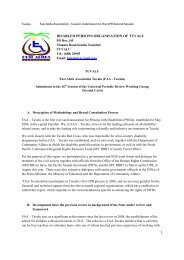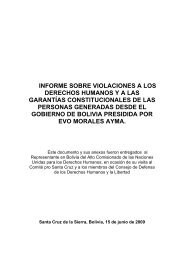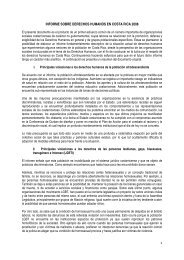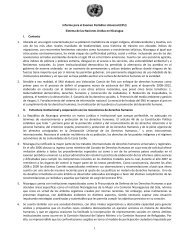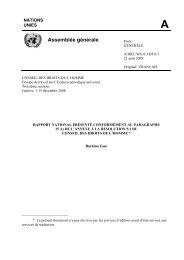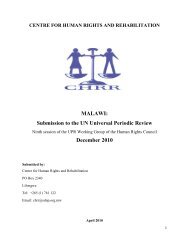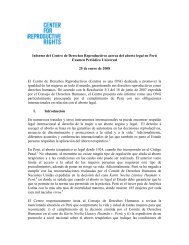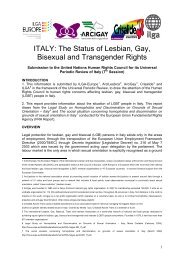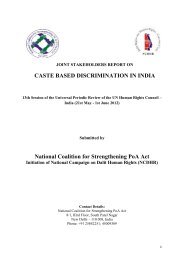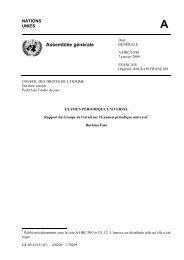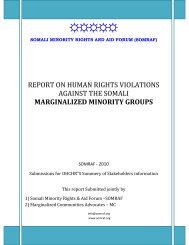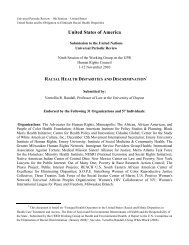Prison Needle Exchange: Lessons from a Comprehensive Review ...
Prison Needle Exchange: Lessons from a Comprehensive Review ...
Prison Needle Exchange: Lessons from a Comprehensive Review ...
You also want an ePaper? Increase the reach of your titles
YUMPU automatically turns print PDFs into web optimized ePapers that Google loves.
could significantly improve the health and safety of prisoners, prison staff, and the community<br />
by instituting needle exchange programs.<br />
Methadone maintenance therapy<br />
a partial solution to the harms of IDU<br />
Methadone is a crucial element of a comprehensive harm-reduction strategy, both in prisons<br />
and in the community, as it provides an important option for injection-drug-using prisoners<br />
who wish to stop injecting heroin. Taken orally, methadone is successful in blocking the<br />
effects of opiate withdrawal symptoms. 273 As a result, methadone<br />
maintenance therapy (MMT) is effective in reducing major risks,<br />
harms, and costs associated with untreated opiate addiction among<br />
patients attracted into and successfully retained in MMT. 274 MMT is<br />
associated with reduced HIV and viral hepatitis transmission<br />
rates. 275 Worldwide, an increasing number of correctional systems<br />
are offering MMT to prisoners. 276 Evaluations of MMT programs in<br />
prisons have indicated positive results. 277 For example, results <strong>from</strong><br />
a prison in New South Wales, Australia, indicated lower rates of<br />
heroin use, injection drug use, and syringe sharing among those<br />
enrolled in MMT compared with prisoners in a control group. 278<br />
In Canada, in May 2002 CSC expanded access to MMT. 279 Under the new policy, prisoners<br />
on methadone maintenance at the time of incarceration may continue methadone, and<br />
prisoners who meet the expanded access criteria may apply to initiate MMT while incarcerated.<br />
The expansion of access criteria for MMT was based in part on evaluations undertaken<br />
by CSC demonstrating that MMT has a positive impact on release outcome and on institutional<br />
behaviour. 280 Access to MMT in provincial and territorial prisons varies widely. 281<br />
Despite its value, there are several reasons why providing methadone maintenance in the<br />
absence of needle exchange is an insufficient response to the risk of HIV and HCV transmission<br />
in prisons via injection drug use. The primary reason is that MMT, as a form of drug<br />
treatment for heroin dependence, does not benefit prisoners who do not access the treatment<br />
program. There are at least four potential circumstances in which prisoners will not access,<br />
or not have access to, MMT. First, prisoners who inject heroin may choose not to access<br />
MMT. Second, despite an addiction to heroin, prisoners may not meet all of the criteria for<br />
admission to the MMT program or may fail to meet ongoing eligibility criteria once on<br />
MMT. Third, under current CSC policy, limits have been placed on the number of prisoners<br />
enrolled in MMT at any one time, based on the capacity to administer the program within<br />
each institution. The issue of lack of capacity and resources is not unique to CSC and is likely<br />
shared by a number of Canadian provincial/territorial systems. Fourth, it takes time to<br />
process an application for MMT and to initiate MMT once a prisoner is accepted into the<br />
program. Therefore, there will be numerous situations where prisoners with a heroin addition<br />
will continue to inject heroin and potentially engage in high-risk behaviours, despite the<br />
existence of MMT programs within the prison.<br />
Additionally, under accepted guidelines, MMT is only for drug users who are physically<br />
dependent upon opiates according to standard criteria (usually those set out in the Diagnostic<br />
and Statistical Manual of Mental Disorders, published by the American Psychiatric<br />
Association). Therefore, MMT is not medically indicated for people who are occasional or<br />
recreational users who inject opiates, who again will likely continue to inject and to share<br />
syringes where needle exchange is not provided. Within prisons, barriers often exist to the<br />
optimal provision of methadone. As a medical therapy, a methadone program requires the<br />
involvement of a prison physician who is both trained in methadone provision and philo-<br />
Methadone is a crucial<br />
element of a comprehensive<br />
harm-reduction strategy,<br />
both in prisons and<br />
in the community.<br />
62 <strong>Prison</strong> <strong>Needle</strong> <strong>Exchange</strong>: <strong>Lessons</strong> <strong>from</strong> a <strong>Comprehensive</strong> <strong>Review</strong> of International Evidence and Experience



